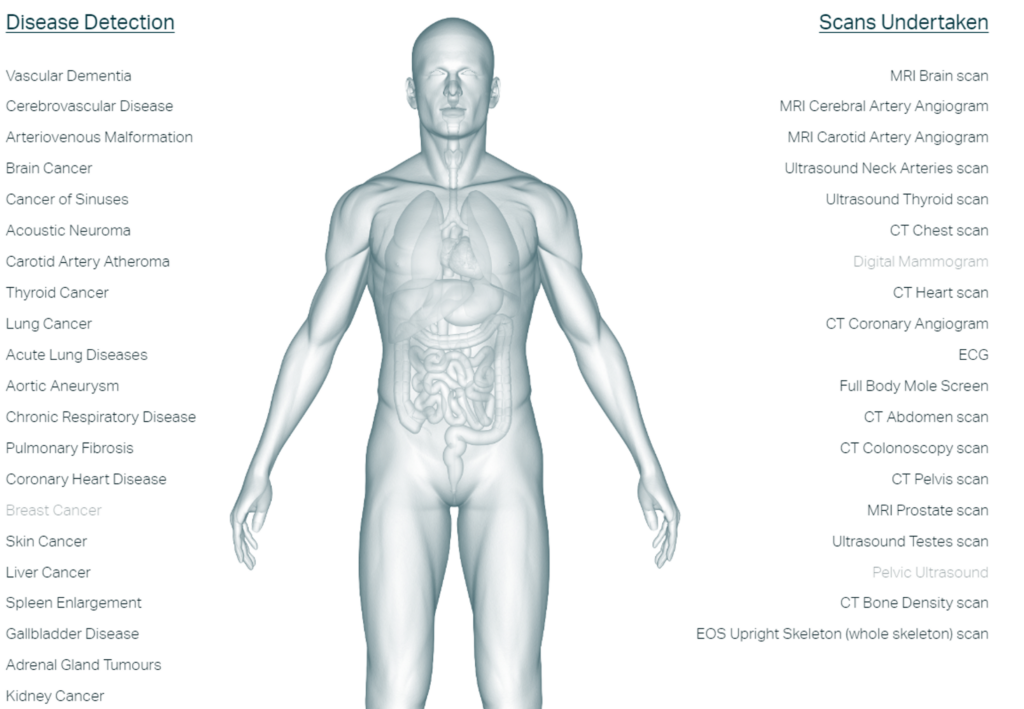When an abnormal growth of cells develops in an uncontrolled way, this is called cancer. In some cases, these cells can spread to other areas of your body through a process called metastasis.
There are hundreds of different types of cancer, and most are named after the organ or type of cell in which they originate, even if the cancer has spread to another organ.
Because there are so many types of cancer, different screening techniques and tests are used to detect them. In this post, we will explore these various methods of cancer diagnosis, highlighting why it’s important to detect cancer early and where you can attend a screening in London.
Why diagnosing cancer early is so important
Early detection is very important.
Hard-to-detect cancers like pancreatic and ovarian cancers continue to have low survival rates simply due to typically being at a more advanced stage before symptoms are fully investigated.
Some people underestimate their risk of certain cancers due to the stigma that surrounds them.
With lung cancer, for example, 18% of people who develop it are actually non-smokers, which could contribute to late detection and, therefore, lower survival rates; sadly, just 10% of people survive for more than ten years after their diagnosis.
Often, there is plenty of chance to detect cancer earlier.
Colon cancers develop over 10 to 15 years from tiny polyps which gradually increase in size. By the time they cause symptoms such as weight loss or bleeding, they will have likely spread to the point that treatment is much more difficult.
Whilst the UK government is aiming for 75% of cancers to be diagnosed in stages 1 and 2 by 2028, there is a long way to go until then and this still means that 25% of cases will be diagnosed too late.
How is cancer diagnosed?
There are many ways to detect and diagnose cancer. Typically, you will see your GP once you experience symptoms like:
- Unexplained weight loss
- Blood in the stool
- A persistent cough
- Unexplained pain or ache
- Changes to a mole
- An unusual lump
To discover the underlying cause of your symptoms, tests such as blood tests, magnetic resonance imaging (MRI) scans, computed tomography (CT) scans, endoscopies and biopsies will be carried out.
If these then lead to a cancer diagnosis, you will be referred to a consultant through the NHS and your treatment options will be explored in further detail.
Some types of cancer are easy to spot. Changes to moles or lesions on the skin, for example, can be caught early if you make an effort to check and attend mole screenings.
However, organs like your liver or colon cannot be seen as easily. So, if a tumour develops there, you may only be aware once it is big enough to cause symptoms — and herein lies the problem.
Because further testing by the NHS is usually only carried out once you are symptomatic, the cancer often has a chance to progress and spread. This is why almost half of cancers in England are diagnosed at a late stage, meaning you could miss out on potentially curative treatments.
How is cancer diagnosed in asymptomatic people?
The earlier cancer can be detected, the better — and ideally, before any symptoms manifest.
Some cancers are easy to identify and diagnose, such as skin cancers. If you pay close attention to any changes in the appearance of your moles or unusual lumps and regularly attend full-body mole examinations, this cancer can easily be diagnosed in its early stages.
But what about cancers inside the body or cancers that don’t show any symptoms?
Many of the cancer screening techniques currently available can provide doctors with an in-depth insight into your health, allowing even the smallest of cancers to be identified.
Depending on the part of the body the cancer is in, certain advanced medical imaging technologies may prove superior to others, achieving better, more accurate results.
Methods of testing for cancer
- MRI and CT — these both provide cross-sectional images of the body part being scanned whilst you lie in the scanner. However, CT uses X-rays whilst MRI uses powerful magnetic fields and radio waves. CT is therefore best for imaging the lungs, colon, heart arteries and bone, while MRI is ideal for imaging the brain, prostate and metastases to the bone.
- Ultrasound — can image soft tissues such as the testes, ovaries or thyroid gland. If it reveals masses in these tissues they may be further investigated via an MRI or a biopsy to determine whether they are cancerous.
- X-ray — a quick and easy technique that may detect damage to bones caused by cancer and is particularly good at imaging dense masses in soft tissues such as the lungs. But, as it is low resolution, this means cancers have to be a certain size before they become visible.
- Mammogram — this involves pressing your breasts between two plates whilst X-ray images are taken to image the breasts for signs of cancer.
- Mole screening — a dermatologist or experienced nurse will examine a mole or lesion on your skin and may perform a biopsy to test it for cancer.
- Endoscopy — a procedure where organs inside the body are looked at using an endoscope, which is a long thin flexible tube with a light and camera on one end.
- Blood tests — may be used to detect tumour markers, which are often proteins produced by cancer cells, or circulating tumour DNA (cDNA). Other tests can reveal abnormalities that may indicate your body is fighting cancer, such as an unusually low or high number of certain white blood cells.
Unfortunately, a general practitioner will usually only refer you for further testing and imaging once you are symptomatic, by which point the cancer will have had a chance to progress. Therefore, if you want to take control of your health, a preventative health assessment is your best port of call – especially if you know you have an increased risk of cancer already.
Cancer screening in London via a preventative health assessment
Preventative health assessments involve a variety of testing and imaging techniques and are a fantastic investment if you want to prevent one of the ‘Big four’ cancers — heart disease, lung disease and stroke.
Men over 35 and women over 40 can benefit most from attending a preventative health assessment.
Based on Harley Street, London, Echelon Health offers the most comprehensive health assessments in the world.
Through our independently verified data analysis from the Office of National Statistics, we have created a Platinum health assessment that can detect 92% of the avoidable causes of death in men and 95% in women.
Here are some of the key reasons to consider booking a cancer screening in London with us:
- Tailored to your needs — before any tests are performed, your medical history will be discussed in depth with a renowned consultant physician to ensure the assessment is tailored to your needs.
- State-of-the-art equipment — Echelon operates a 3 Tesla MRI machine, which is renowned for its high resolution. The NHS primarily operates 1.5 Tesla MRI machines. There are only four EOS CT scanners in operation in the UK, one of these is housed in our Harley Street centre and is used for our health assessments.
- Full body mole screen — Echelon is partnered with The Mole Clinic, which leads the UK in skin cancer screening and mole removal. This is also included in our Premium health assessments.
- Blood tests for over 40 parameters:
-
- CA 19.9 and CA 125 — markers for breast cancer and ovarian cancer respectively
-
- PSA (prostate-specific antigen) — to detect prostate cancer
-
- CEA — a general tumour marker
-
- Full blood count — which measures the relative amounts of white blood cells that may indicate the presence of cancer
- Up to seven specialist radiographers may review your results — each reporting on their particular area of expertise.
- Referral to top consultants and specialists — if any concerns are detected, we will immediately refer you to a highly experienced specialist to discuss an appropriate treatment plan.
- Early detection — anything flagged up will likely be in its early stages and will not yet have caused any obvious symptoms. Therefore, you will likely have treatment options and a promising outcome if you are diagnosed with cancer.
- Receive lifestyle and health management advice — our experts can provide you with a detailed understanding of your health and recommend actionable steps to help improve it.
To book an Echelon Health Assessment, call us at +44 (0)20 7580 7688 or click on the ‘Make an Enquiry’ button opposite. We would be happy to answer any questions or queries you might have.
Sources:



